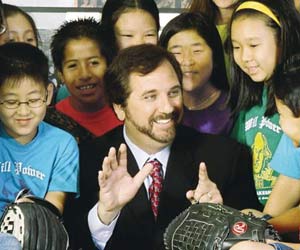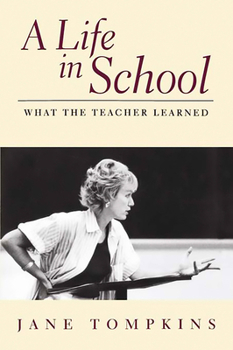A Life in School: What the Teacher Learned
Select Format
Select Condition 
Book Overview
In this text, one of America's leading literary scholars looks back on her own life in the classroom, and discovers how much of what she learned there needs to be unlearned. This description may be from another edition of this product.
Format:Paperback
Language:English
ISBN:0201327996
ISBN13:9780201327991
Release Date:December 1996
Publisher:Basic Books
Length:256 Pages
Weight:0.95 lbs.
Dimensions:0.7" x 5.4" x 8.3"
Customer Reviews
3 ratings
Humanity in the Humanities
Published by Thriftbooks.com User , 15 years ago
A Life in School fluidly incorporates autobiographical support for Tompkins' arguments for more humanity in the humanities. Entertaining and illuminating!
Awakenings
Published by Thriftbooks.com User , 26 years ago
As a new member of the profession, Tompkins book enlightened me as to the reason we have paralysis in higher education - its not that the paralysis is required, but its a feature of those of who are a part of it. As I read about Tompkins discoveries, something as simple as recognizing that a teacher needs to 'read the room' and tailor learning to the mood, convinced me that I am doing something right. But the disturbing part to discover is that while Tompkins has awakened herself to new approaches to teaching, her colleagues are still largely unaware. her presentation of her childhood - and the final connection to how this affects her teaching was dead-on.
A must-read about Tompkins' journey through life & academe
Published by Thriftbooks.com User , 27 years ago
I enjoy reading books by women about women as they perceive their journey through academe. This is an especially good piece of work. Tompkins is an English professor at Duke. The book is autobiographical and profoundly evocative. It is an intense interpretation of the innertwinings of her personal and professional life. Tompkins discusses her life--from elementary school, through her doctoral program at Yale, through her life as a nontenured and then tenured faculty member--and, in the process, discusses issues that are important to so many of us in the Academy. She writes wonderfully about teaching, learning, and working at a research university. This is a book that will make you laugh, cry, and shake your head because of the way that she is so thoroughly introspective and incisive. Here's just a sample: "Peacable kingdoms aren't born; they are made. And that is why it seems to me that the university, like other places of employment, needs to become aware of itself as a social organism. This would mean that the leadership would become self-conscious about the nature of human interaction on the campus, finding a way to involve everybody--undergraduates, secretaries, janitorial staff, administrators, professors at all ranks, part-time faculty, graduate students, and visiting scholars. It would mean devoting time and effort to building good relationships. Right now, the culture of the research university militates agains the quality of life because such concerns are regarded as peripheral to the university's main business. They're perceived as unintellectual, more or less on the level of housekeeping.... But if research universities like the one I work at are going to become places where people like to come to work in the morning, where the employees have a stake and feel they belong, then they will have to model something besides the ideal of individual excellence--the Olympic polevaulter making it over the bar. By modeling the way that they do business, they'll need to model our dependence on one another, our need for mutual respect and support, acceptance, and encouragement. If the places that young people go to be educated don't embody the ideals of community, cooperation, and harmony, then what young people will learn will be the behavior these institutions do exemplify: competition, hierarchy, busyness, and isolation." Her observations about undergraduate education and teaching, as well as the description of her personal jouney as a teacher, are first-rate. The chapters entitled, "Ash Wednesday" and "The Cloister and the Heart," are among the best--if not the best--in the book. For example, in the "Cloister" chapter, she writes: "The university has come to resemble an assembly line, a mode of production that it professes to disdain. Each professor gets to turn one little screw--his specialty--and the student comes to him to get that screw turned. Then on to the next. The integrating function is left entirely to the student....
A Life in School: What the Teacher Learned Mentions in Our Blog

Teacher Memoir: Finding Inspiration and Motivation
Published by ThriftBooks Team • April 19, 2022
Looking for some inspiration or motivation to boost your teaching morale? ThriftBooks offers great teacher memoirs written by educators for educators recounting inspiring stories.




